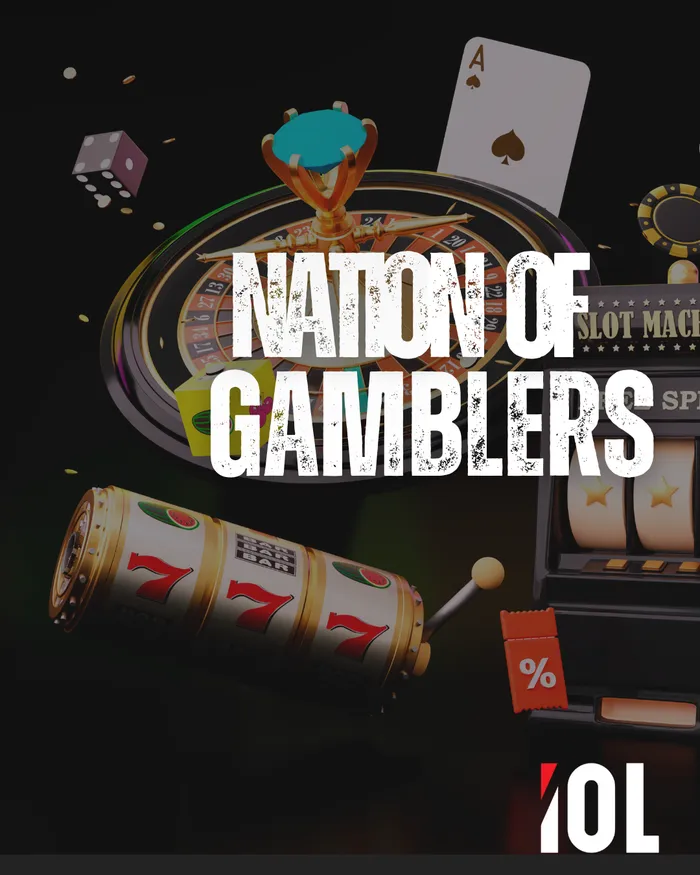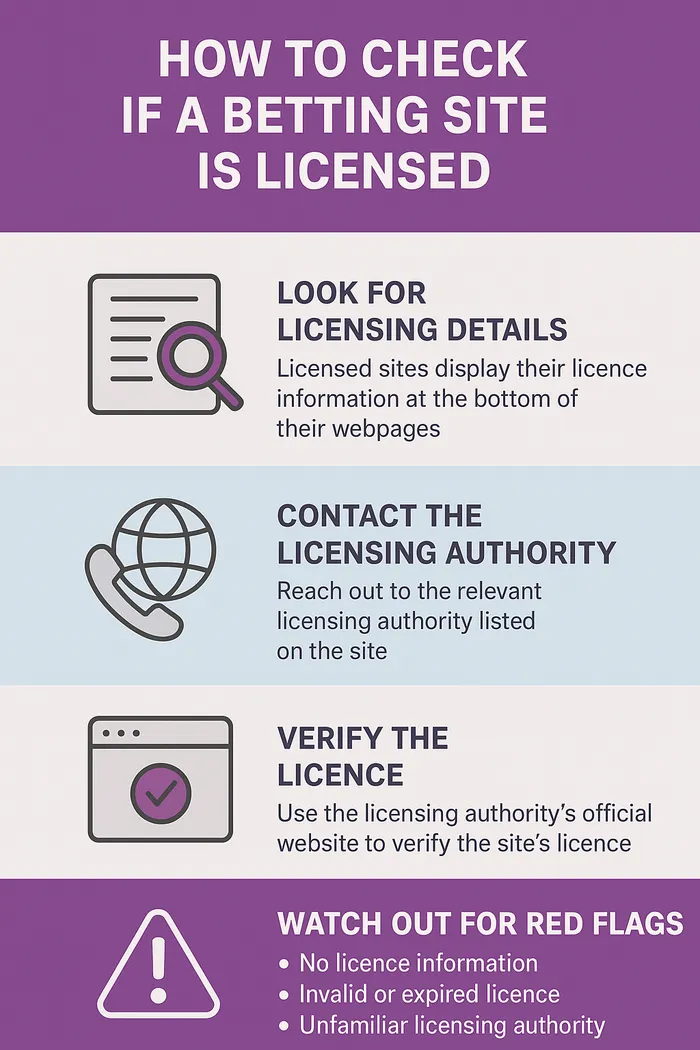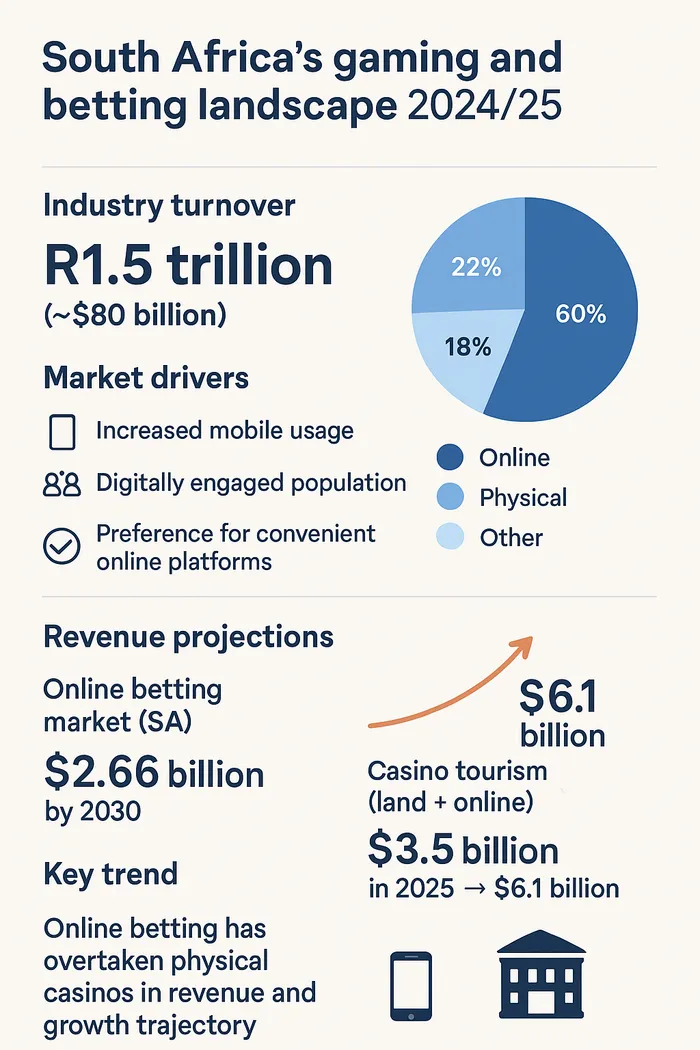Think online gambling is legal in SA? The truth may surprise you

You can bet on the outcome of a gambling game, but you can't gamble online.
Image: IOL Graphics
Can South Africans gamble online?
The answer depends on a subtle but critical distinction that most players don't understand.
Online betting is legal. Online gambling is not.
The line between the two may seem technical, but it determines whether you're operating within the law or breaking it.
Online betting—placing wagers on sports results, event outcomes, or even the roll of a dice—is permitted.
Sites like Hollywoodbets allow users to predict outcomes and stake money on their predictions.

How to check if a betting site is licenced.
Image: ChatGPT
If you're right, you win according to the odds the platform sets. The key factor: you're not playing the game yourself. You're predicting what will happen.
Online gambling—where you actively participate in casino games like poker, slots, or roulette—remains illegal in South Africa.
You cannot legally log into a virtual casino and play blackjack from your Johannesburg apartment, despite offshore sites suggesting otherwise.
How we got here
The legal foundation was established 14 years ago in the landmark Piggs Peak case before the Supreme Court of Appeal. Casino Enterprises, which operated Piggs Peak Casino and related online platforms, challenged the Gauteng Gambling Board's declaration that advertising online gambling was illegal.
The judge's ruling was definitive: online gambling occurs where the punter is located, not where the server is hosted.
This established that South Africans engaging in online gambling, regardless of where the casino operates, are doing so in South Africa—and must therefore comply with South African law.

Growth in the online betting market vs physical casinos.
Image: ChatGPT
Physical gambling was legalized in 1996, following recommendations from the Wiehahn Commission that recognised the potential for tax revenue generation, job creation, economic empowerment, and control of illegal gambling operations.
The industry has since grown into a multibillion-rand sector.
Online gambling appeared poised for legalization when Parliament passed legislation in 2007. However, no licenses were ever issued. Regulations published for public comment in 2009 were never finalised. The legislation simply stalled, leaving a legal vacuum that persists today.
The provincial licensing system
Online betting sites operate legally through a provincial licensing framework.
Any platform wishing to offer services in South Africa must obtain a license from the province where it operates or targets customers.
These licenses come from provincial gambling boards, not the National Gambling Board.
This creates an unusual geographic enforcement mechanism in the digital space. Operators track users through IP addresses and require proof of residence to ensure compliance with provincial regulations.
The boundaries are technical and administrative rather than physical, but they are there.
The offshore risk
Despite the legal prohibition, offshore online casinos remain accessible to South African users. Some actively market to South African players. These operations are illegal.
Authorities regularly block or shut down such sites, though new ones frequently emerge under different domain names. The legal exposure extends to both operators and players, who can face fines and potential prosecution.
More practically, players who win on illegal offshore platforms have no legal recourse if the operator refuses to pay out. You cannot enforce a claim arising from an illegal transaction.
The industry's growth
The distinction between legal betting and illegal gambling has not slowed the online sector's expansion.
Online betting has surpassed physical casinos in both revenue and growth.
As of the 2024/25 financial year, South Africa's gambling industry recorded a turnover of R1.5 trillion.
Online betting accounted for approximately 60% of gross gambling revenue, according to the Institute of Addiction and Gaming.
Increased mobile usage, digital literacy, and preference for convenience have driven this shift.
Grand View Research projects the online gaming market in South Africa will reach around $2.66 billion by 2030, assuming continued growth in the legal betting sector.
What may change
The legal landscape could shift. Last year, a private member's bill – the Remote Gambling Bill – was introduced to Parliament.
According to CMS Law, the bill aims to regulate interactive gambling and establish uniform national standards for remote gambling operations.
If passed and properly implemented, it would resolve the regulatory inconsistencies that have existed since 2007.
The industry, players, and regulators continue to watch its progress.
The Bottom Line
South Africans can legally bet online through licensed provincial platforms.
They cannot legally gamble online at virtual casinos, regardless of marketing claims from offshore operators. The distinction matters both legally and practically.
You can bet on online gaming – of betting – just don’t take a gamble online.
For those struggling with gambling, the South African Responsible Gambling Foundation operates a toll-free counselling line at 0800 006 008, or via WhatsApp/SMS to 076 675 0710, or email at helpline@responsiblegambling.org.za.
IOL Business
Get your news on the go. Download the latest IOL App for Android and IOS now.